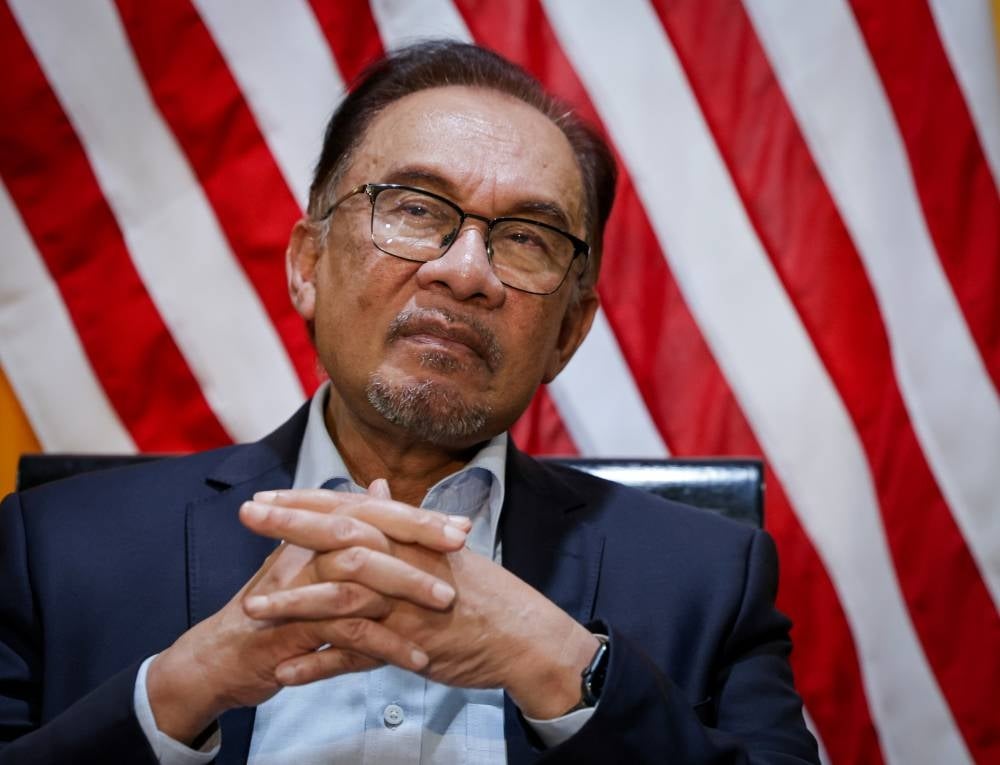A busy 100 days for Anwar in bilateral and international relations
04 Mar 2023 10:55am

Prime Minister Datuk Seri Anwar Ibrahim. - BERNAMA
World leaders were quick to congratulate Anwar, an internationally-known figure who was seen as a victim of political fallout back home for over more than two decades. Many also marveled at his dramatic appointment after the 15th General Election that produced a hung parliament.
Saturday (March 4) marks his first 100 days in office, and he is expected to continue receiving calls and greetings from foreign leaders even after this milestone. Looking back on the day he was appointed, Indonesian President Joko Widodo was the first to call Anwar through phone, followed by Turkiye's President Recep Tayip Erdogan.
Since then, he had received phone calls from a number of leaders including Pakistan's Prime Minister Shehbaz Sharif.
Anwar also received a number of foreign leaders who made a courtesy call to him and he visited five of the country’s immediate neighbours within his first 100 days in office.
Just four days after taking the oath of office, Anwar received Sultan Hassanal Bolkiah of Brunei who arrived in Malaysia on November 28. Ten days later, he received Thai Deputy Prime Minister Gen. Prawit Wongsuwan (Dec 8); and four days after that, he received Timor-Leste’s President José Ramos-Horta (Dec 12).
The last leader he received before the 100-day milestone is German President Frank-Walter Steinmeier on Feb 17. In between, he received a number of ministers and emissaries sent by the respective countries to congratulate him and rekindle bilateral ties.
Among the foreign ministers who paid a courtesy call to Anwar was Singapore’s Vivian Balakrishnan; and the latest before the 100-day mark is Australia’s Penny Wong.
Anwar wasted no time in fulfilling the tradition of paying courtesy calls on immediate neighbours after being appointed as prime minister, starting with Indonesia, followed by Brunei, Singapore, Thailand, and recently, the Philippines.
During the visit to Jakarta from Jan 8-9, he met his Indonesian counterpart Joko Widodo at the Bogor Presidential Palace.
Anwar, who is known in Indonesia as a leader of political struggle and reforms, was also pleased to be able to meet many acquaintances, including religious, cultural and political figures, as well as former ministers, during the visit.
Among the matters discussed by both sides included issues involving the economy and bilateral investments; the development of Indonesia’s new capital, Nusantara; border demarcation that had dragged on for 60 years; and Indonesian manpower in Malaysia.
After Indonesia, Anwar headed to Bandar Seri Begawan in Brunei for a two-day visit from Jan 24-25 where he had an audience with Sultan Hassanal Bolkiah at Istana Nurul Iman.
During the visit, he said apart from the commitment to maintaining existing cooperation, Malaysia’s Unity Government under his leadership would strive to explore new strategic cooperation with Brunei.
He also welcomed the intention and offer from Brunei to invest in various high-potential economic sectors in Malaysia, including by the Brunei Investment Agency (BIA).
After Brunei, Anwar headed to Singapore on Jan 30 for a one-day visit where, during his toast speech at a lunch hosted by his counterpart Lee Hsien Loong in the republic, he said he saw food security as a new area to be explored with Singapore.
Lee, in his speech, said he and Anwar had a fruitful discussion including on how both countries could make progress on outstanding bilateral issues.
Meanwhile, Anwar undertook his maiden two-day official visit to Thailand from Feb 9-10 where he held a meeting with his Thai counterpart Prayuth Chan o-cha.
Both leaders touched on outstanding issues including ending the conflict in south Thailand - where Malaysia has worked as the facilitator for the peace dialogue process.
Anwar and Prayuth agreed that political will is important in resolving the conflict with Malaysia, and that violence in resolving the conflict will not be tolerated.
He also said to his Thai counterpart that ASEAN should take coherent and concerted efforts as a regional body in solving the Rohingya crisis in Myanmar, adding that Prayuth was in a better position to express the region’s concern about Myanmar.
Anwar’s most recent visit before reaching the 100-day mark is to the Philippines from March 1-2, and he was the first official guest of Ferdinand Marcos Jr since the latter’s appointment as the president of the republic on June 30, 2022.
The visit highlighted the importance of the Philippines as a neighbour and fellow member of ASEAN.
While in Manila, Anwar was conferred the degree of Doctor of Laws, honoris causa, from the University of the Philippines (UP) as a scholar and an internationally-acclaimed expert on economics, democracy, freedom, governance, Islam and democracy, and the need for accountability.
During a talk at the same university, he pointed out that decision-making by consensus continues to be the central tenet of ASEAN, but it did not mean the regional grouping should remain silent over developments in member states that affect the wider region.
Marcos, meanwhile, expressed optimism that the long-standing friendship between Manila and Kuala Lumpur would enable them to surpass the present and future challenges, which include "geopolitical upheavals, supply disruptions, and inflation.”
As Anwar and Turkiye's Erdogan enjoyed close friendship, it was not surprising that Malaysia was among the earliest to send the SMART team to rescue victims in the Feb 6 devastating earthquake. Anwar even went further to show solidarity with Turkiye when he went to see for himself the rescue efforts of the Malaysian teams there on Feb 15. Malaysia has so far pledged up to RM20 million in humanitarian aid for Turkiye and neighbouring Syria.
It was certainly a busy first 100 days for Anwar in bilateral and international relations. More visits by Anwar to foreign countries and more visits by foreign leaders to Malaysia can be expected. - BERNAMA









